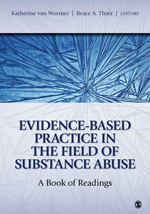Evidence-Based Practice in the Field of Substance Abuse
A Book of Readings
Katherine S. van Wormer - University of Northern Iowa, USA
Bruce A. Thyer, Ph.D. - Florida State University, USA
Offering readers the most current knowledge on what works in substance abuse treatment today
This one-of-a-kind anthology presents state-of-the-art material to help researchers better understand which interventions work and why, and it includes editorial commentary and critical thinking questions for each selection. The editors have organized this volume according to the process of evidence-based practice—introduction to evidence-based practice, assessment, gender-based and culturally sensitive interventions, treatment issues and innovations, and policy considerations. Connecting science and clinical research to the practical needs of persons with substance and mental health disorders, this volume is a groundbreaking resource for those who need empirically based material on treatment innovations.
Key Features
- Data on a wide range of cutting-edge issues such as housing for homeless alcoholics and use of prescription medications to reduce drug cravings
- Content by forward-looking experts in substance abuse treatment that promotes a public health perspective
- Five-part organization focused on the major practice domains of parentcentered intervention, gender-based and culturally sensitive programming, and interventions across the life span
Target Audience
This is a must-have resource for substance abuse and mental health practitioners, faculty, policy makers, and students.
Available formats
See what’s new to this edition by selecting the Features tab on this page. Should you need additional information or have questions regarding the HEOA information provided for this title, including what is new to this edition, please email sageheoa@sagepub.com. Please include your name, contact information, and the name of the title for which you would like more information. For information on the HEOA, please go to http://ed.gov/policy/highered/leg/hea08/index.html.
For assistance with your order: Please email us at textsales@sagepub.com or connect with your SAGE representative.
SAGE
2455 Teller Road
Thousand Oaks, CA 91320
www.sagepub.com
- Provides a collection of readable yet empirically-based selections on treatment effectiveness for substance abuse clients from diverse background;
- Uniquely includes data on a wide range of issues that on the cutting edge—housing for homeless alcoholics, use of prescription medications to reduce drug cravings, natural recovery without treatment, harm reduction practices, and motivational interviewing strategies;
- Organizes material written by forward-looking experts in substance abuse treatment that prepare us for the paradigm shift that promotes a public health rather than criminal justice approach to addictive behavior.
- Offers a five-part organization that focuses on the major practice domains of parent-centered intervention, gender-based and culturally-sensitive programming, and interventions across the life span;
- Includes in one book empirically-based material on treatment innovations, for example, motivational interviewing, drug courts, and housing first experiments.

